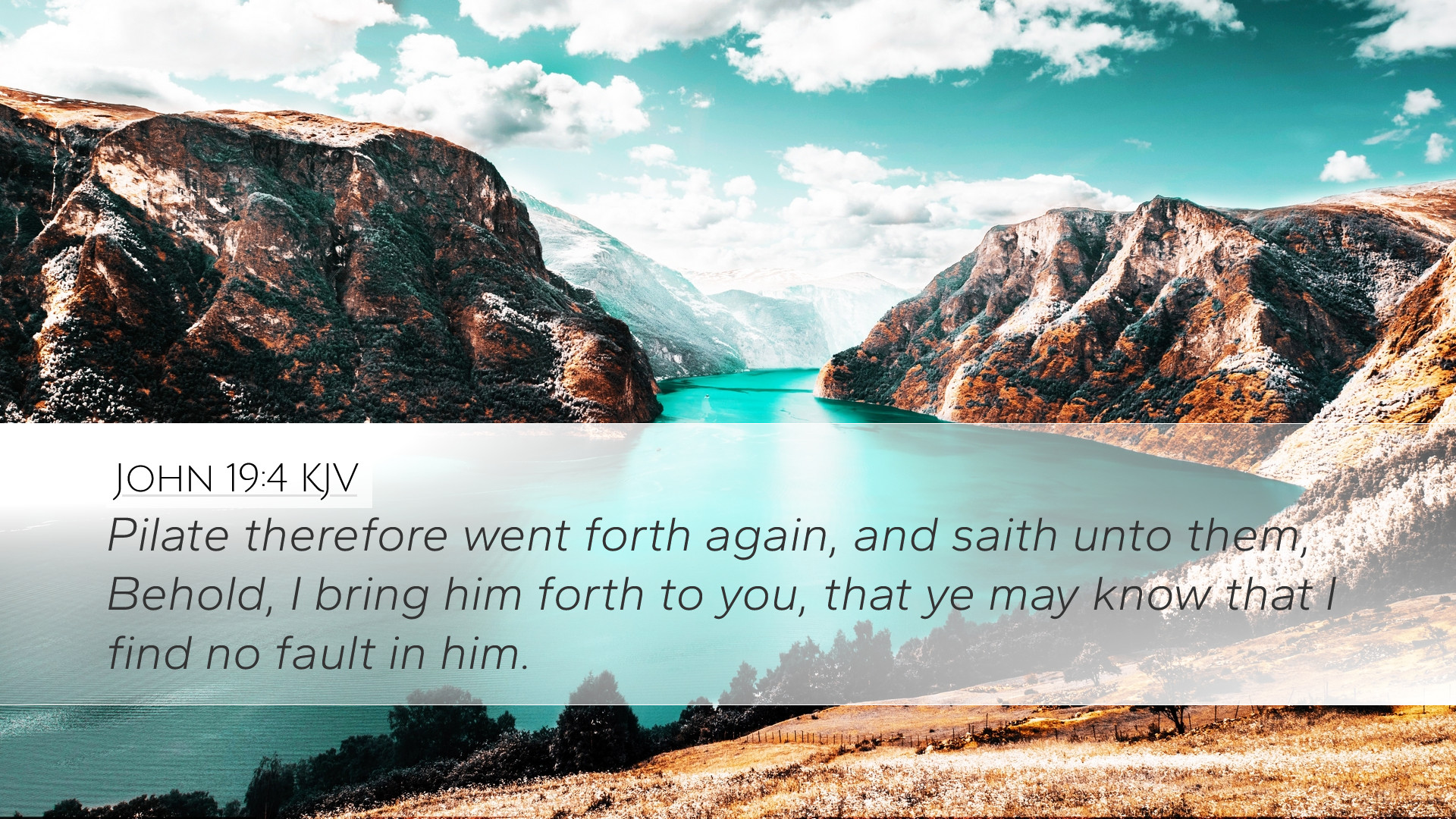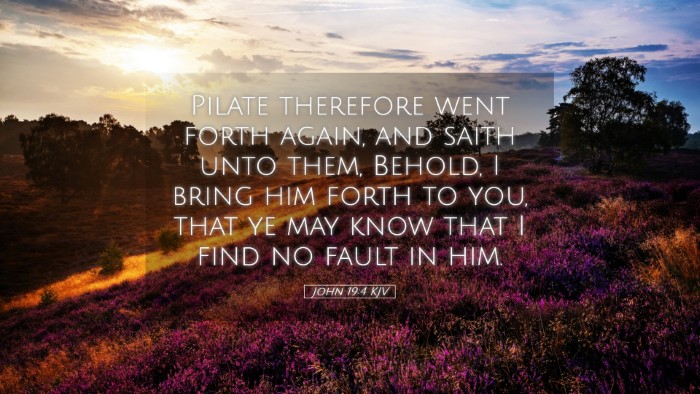Commentary on John 19:4
John 19:4 states: “Pilate went out again and said to them, ‘See, I am bringing him out to you that you may know that I find no guilt in him.’” This verse serves as a crucial moment in the narrative leading up to the crucifixion of Jesus Christ. The insights from renowned public domain commentators such as Matthew Henry, Albert Barnes, and Adam Clarke will be synthesized here to provide a meaningful exposition of this verse for pastors, students, theologians, and scholars.
Contextual Background
The passage occurs during the trial of Jesus before Pontius Pilate, the Roman governor. It is essential to understand the historical and sociopolitical context in which these events unfold. Pilate represents Roman authority while the Jewish leaders are adamant about condemning Jesus. This interaction highlights the tension between Roman law and Jewish religious authority.
Insight from Matthew Henry
Recognition of Innocence: Matthew Henry emphasizes Pilate's declaration of Jesus's innocence. Pilate repeatedly asserts that he finds no fault in Jesus, which indicates the moral dilemma in the trial. Pilate, in his role, acknowledges the injustice being done against an innocent man. This insistence on Jesus’s lack of guilt not only underscores Jesus’s sinlessness but also reflects the lawyer's duty to uphold justice.
Public Perception: Henry also notes that Pilate's actions serve to appease the Jewish leaders, reflecting the deeper political motivations that overshadowed the moral question of Jesus's guilt. Pilate's intent to show the crowd that he finds no guilt in Jesus reveals the complexities involved in maintaining public order and political stability.
Insights from Albert Barnes
The Nature of the Accusations: According to Albert Barnes, the nature of the trials that Jesus underwent was marked by inconsistency and malice. Barnes points out that Pilate’s repeated denials of guilt are significant. They highlight not only Jesus’s purity but also the corruption of the judicial system of the time. Pilate represents a figure who recognizes truth yet succumbs to the pressure of the public's demands.
The Contrast of Authority: Barnes further contrasts the authority of Christ with that of Pilate. While Pilate claims authority as the governor, it is Jesus who possesses real authority and power, even amid suffering. This commentary serves as a reminder to believers that true authority is found in righteousness and truth, not in political structures.
Reflection from Adam Clarke
Pilate’s Reluctance: Adam Clarke explains Pilate's reluctance to condemn Jesus. Pilate's public statement, “I find no guilt in him,” suggests a desire to distance himself from the impending decision of injustice. Clarke introduces the notion that Pilate's own conscience is at war with the demands placed upon him by the Jewish leaders, creating a psychological struggle within him.
Foreshadowing Events: Clarke also mentions that Pilate’s pronouncement serves as a foreshadowing of the ultimate fate of Christ and the ultimate rejection of divine truth by humanity. The declaration put forth by Pilate stands as a tragic testament to the judgment of innocence and the consequences of rejecting truth.
Theological Reflections
This verse, John 19:4, carries rich theological implications. It accentuates the themes of justice, authority, and guilt. The insistence on Jesus’s innocence creates a profound moral challenge that resonates with both historical and contemporary audiences.
- Justice and Injustice: The verse evokes the struggle of upholding justice in the face of societal pressure and fear of loss of authority.
- Redemption through Innocence: Jesus as the innocent lamb of God is a poignant reminder of the central theme of redemption, where his innocence leads to the salvation of many.
- Political Power vs. Divine Sovereignty: The narrative invites contemplation on the relationship between earthly authorities and divine will, encouraging believers to seek deeper truths beyond worldly judgments.
Application for Modern Disciples
For pastors and theologians, this passage serves as a call to examine their own roles in speaking truth to power and advocating for justice in their communities. It challenges every believer to reflect on the implications of Jesus's trial in their own lives and in the public sphere.
Students of scripture can draw parallels to today’s moral dilemmas, recognizing that the principles of justice and truth continue to be contested. Furthermore, understanding Pilate's inner conflict can inspire personal introspection regarding how one navigates the pressures of society versus personal conviction.
Conclusion
John 19:4 stands as a powerful testament to the struggle between truth and power, justice and complicity. Through the lens of public domain commentaries, we gain deeper insights into this significant moment in the passion narrative. This verse invites a profound examination of the nature of justice and our roles in the continuing story of faith, hope, and redemption.


